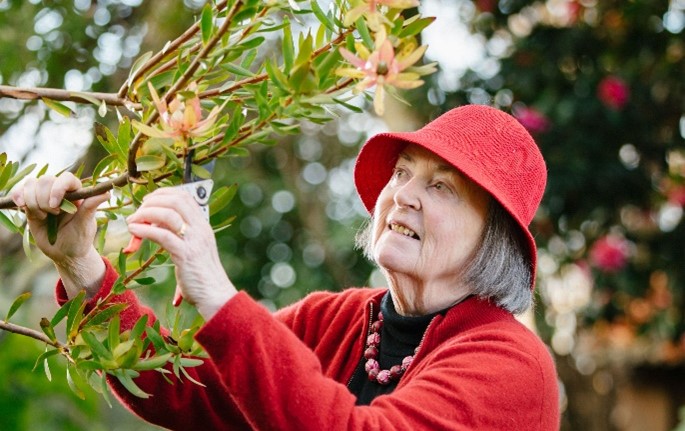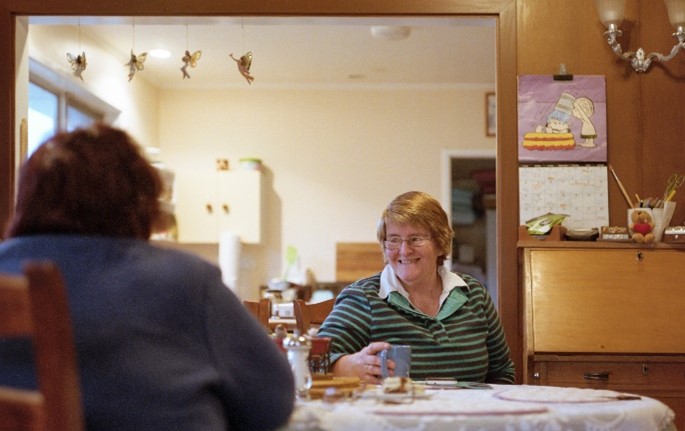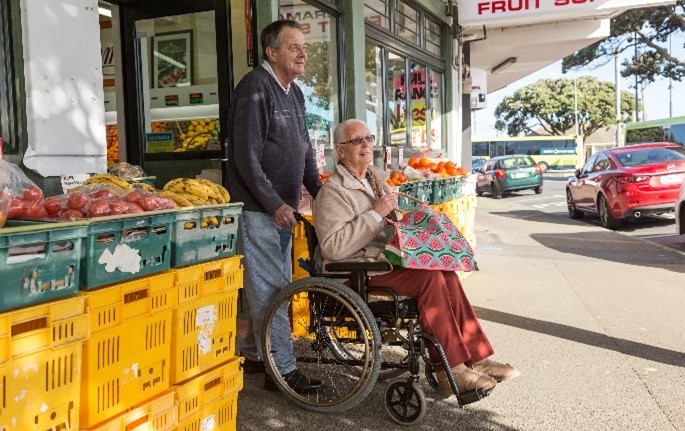Summer is a lovely time of the year, however, when the temperature and humidity rise, we can be more vulnerable to heat-related health problems and injuries, especially as we get older. Here are a few tips to keep yourself cool and hydrated this summer.

Staying cool outdoors
Being outside during summer can be tough when dealing with the heat and humidity. The temperature outside does not have to be high to put older people at risk for a heat-related illness. There are many little ways we can protect ourselves from the heat and stay cool when we are outside.
Avoid spending too much time outside – between 11am and 4pm is the hottest part of the day, so try not to spend too much time outside or exercising during this time. You can get sunburnt even on a cloudy day.
Protect your body – the heat can be better managed by wearing a sun hat and light-colored, lightweight cotton clothes. Choose fabric that is loosely woven or well-ventilated, so it doesn’t trap the heat.
Wearing sunglasses – UV rays can cause damage to our eyes, so choosing sunnies with a value of 4 or 5 under the Australian/New Zealand standard for sunglasses can provide coverage for almost all UV radiation. For extra protection, wrap-around sunnies are the best as they offer protection from all sides. Talk to an optician about prescription sunglasses.
Forecast – watch for hot weather warnings or extremely hot temperatures by checking the forecast and the UV index before leaving the house.
Apply Sunscreen – For sun protection follow the ‘Slip, Slop, Slap and Wrap’ rule – Slip on a shirt, Slop on sunscreen, Slap on a hat, and Wrap on sunglasses to protect the eyes and the sensitive skin around them.
Remember to apply sunscreen 20 minutes before heading out and to reapply every two hours, and more frequently when in water or sweating. Sunburn not only causes skin damage and increases the risk of skin cancer, but it can also interfere with the ability to regulate one’s body temperature.
Drink plenty of water – stay hydrated by regularly drinking cool water-based drinks or milk throughout the day. Always carry a drink to avoid being dehydrated and stay hydrated by sipping water throughout the day. Have cool treats available that are low in sugar and have a high water content. Sugar-free popsicles are great for hydration.
Watch out!
Symptoms of dehydration include confusion, cramps, dark urine and feeling weak.
Heat exhaustion symptoms include headaches, dizziness, nausea, and a fast pulse. Heat exhaustion can lead to heatstroke. Seizures and falling unconscious can be symptoms of heatstroke. If you think you or someone you’re with might have heatstroke, immediately call 111.


Healthy Cool Homes
Being in a house that is overheated and stuffy is unpleasant and can also have serious health consequences. It is especially important as we get older to keep our homes dry and cool over the summer. The World Health Organisation recommends keeping the living space between 18 and 21°C. There are many ways to keep our home cool this summer.
Curtains and blinds – to ensure the house does not get overheated, close curtains or blinds on the east side of the home during the morning and the west side in the afternoon to keep rooms at a good temperature. Additionally, close curtains and blinds in rooms that are not being used.
Sun Umbrellas – are a great accessory for your deck or backyard to provide shade. Ensure they have a strong sturdy umbrella base that will hold the sun umbrella firmly and not topple over in the wind as this could cause injuries.
Electric Fans – as with any electric appliance, keep everything, including yourself, at least one metre away from circulating fan blades. Keep fans clear of obstacles so air can circulate easily.
Open Doors and Windows – fresh air is best. The ability to safely leave your windows and doors open during the day can also help keep your home cool.
Heat Pumps – use temperature controls correctly to avoid wasting energy.
Smarter Lighting – replace incandescent, halogen, or compact fluorescent (CFL) bulbs with LEDs. They consume significantly less energy, release less heat, and last notably longer.
Appliances – turn off lights and appliances that are not being used as they generate heat. Check your power supplier by visiting www.Powerswitch.org.nz to see if you can get a better power deal elsewhere.
Food safety – follow the four ‘c’ rules: clean, cook, cover, chill. Clean hands, surfaces, and food. Fully cook meats and seafood. Cover your food to stop bugs, ants and flies. Chill food in the fridge between 2° and 4°C.

Warmer Kiwi Homes grant
Heat pumps can help keep us cool over the summer. Warmer Kiwi Homes is a government programme offering insulation and heating grants for low-income homeowners. The grant can still be considered outside the winter months.
This funding is not available to people renting a home. Grants cover up to 90% of the total cost of ceiling and underfloor insulation and/or 80% of the cost of an approved heater. Heater grants are capped at $3,000 including GST. To see if you are eligible visit – https://www.eeca.govt.nz/co-funding/insulation-and-heater-grants/warmer-kiwi-homes-programme


Exercise
During the summer months, we are more likely to get out and about and exercise more. Physical activity is great. It increases blood flow throughout the body, stimulating energy and brain activity. It is recommended that adults over the age of 65 have at least 150 minutes a week (30 minutes a day) of moderate exercise for strength, balance, and agility. However, we need to manage the risks of exercising during the summer.
Limit strenuous activity and exercise – our bodies work hard enough during the hot days to keep cool, so adding strenuous physical activity can be detrimental. When exercising regularly, try doing the routine during the early morning or late evening when the temperature is cooler.
Avoid direct sun exposure – try and stay out of the sun between the hours of 11am and 4pm when it is at its hottest.
Cooling Down – try a cold, damp cloth on the back of your neck or a sprinkle of water over the skin. When the weather is too hot outside, other forms of activities include:
Housework – housework, believe it or not, keeps you moving. Try spreading out the chores over the day to keep yourself moving and reduce overheating.
Swimming & Aquatic Exercises – enjoy the community pool or the beach for exercise and cooling off.
Online Exercise – television and the internet have a range of programmes for stretching, balance exercises, and dancing. Age Concern’s Steady As You Go © can be found on YouTube.

Medications

Over the summer months, we may wish to travel away from home so be sure to check your medications and order prescription refills in advance. Additionally, obtain a doctor’s letter to validate medications on international trips. It is also a good idea to carry a list of medications including dosages and frequencies as a safety precaution. Storage of Medication – another summer concern is that many medications degrade at temperatures over 30°C (86°F), making them less effective. Double-check with your GP, pharmacist, or the information leaflet to ensure medications are stored correctly


